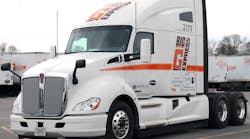Company: Big G Express, Shelbyville, TN
Operation: Brothers Pat and Jack Marsh founded Big G in 1995. Later, Patty Corley and David Nolan joined what is now a fleet of 560 trucks providing long-haul truckload transportation services nationwide. Big G also offers dedicated fleet and warehousing services.
Challenge: Improve profitability by pinpointing and cutting down costs within the trucking enterprise.
Big G Express prides itself on being "a company that's big enough to provide the technology and service you need, but small enough that we know you by name."
Staying updated with technology today and competitive in the market as that kind of midsize carrier can't be hit and miss—you need to know what's going on with costs and where savings can be found, what's profitable and what isn't.
That's all the more important in this case, since Big G's owners created an employee stock ownership plan nearly a decade ago and sold company stock to Big G employees, creating an entirely employee-owned business.
Solution: Drill down into costs with tools from SMC³'s Transportation Costing Group (TCG).
Fleets of this kind increasingly find themselves adding more "eggs to their basket"—offering additional services that customers want. To that effect, TCG's Truckload Cost Information System is designed to help fleet administrators closely examine costs, broken down in useful ways to maximize profit.
SMC³ explains that TCG's Cost Information System platform allows trucking companies to calculate the price of individual loads, a particular trip, or costs by customer over a period of time. Users can examine data to identify waste or potential savings as they find ways to manage the overall fleet better.
The tool can address aspects of fleet administration such as costs related to tractors and trailers: depreciation, maintenance, fuel, lease expenses, salaries, and more. It includes regional fuel prices obtained from the U.S. Dept. of Energy and determines costs by location and miles that trucks cover, also utilizing mapping and routing software supplied by ALK Technologies.
The TCG Cost Information System can be used with subsidiaries as well. Big G Express is in the early stages of implementing the system, and Randy Vernon, the company's president, said it is not yet using the technology with its subsidiary IKE Transportation, which specializes in regional/short-haul steel transit.
But Vernon noted the company is eager to fully implement the TCG system for closer examination of company data—including the true costs of shipping—to help identify areas to improve profitability.
"We're looking forward to drilling down into our costs for each load, lane, and customer in detail," Vernon said. "We'll be able to do that easily because the software integrates with our general ledger; that streamlined process was an important part of our decision and one of the main reasons we decided to adopt the TCG solution."
The Cost Information System can work with both truckload and less-than-truckload models to "connect the dots" between a company's various locations across the country. SMC³ bills the administrative tools as providing a money-saving perspective—especially for those with multiple sites and subsidiary operations.
Jack Jones, director of truckload sales at SMC³, noted that Big G's record is closely tied to its reputation. "Big G Express places a high value on investing in the latest technologies and equipment to maintain its 98% on-time delivery record," he stated. The TCG technology from SMC³ aims to take that further by addressing costs of equipment and routes on a more focused level.
It will take some time to fine-tune, but if Big G follows other fleets that have successfully utilized TCG, it could stand to realize significant gains. After the system is fully implemented, Fleet Owner will reconnect with Big G to hear more.



